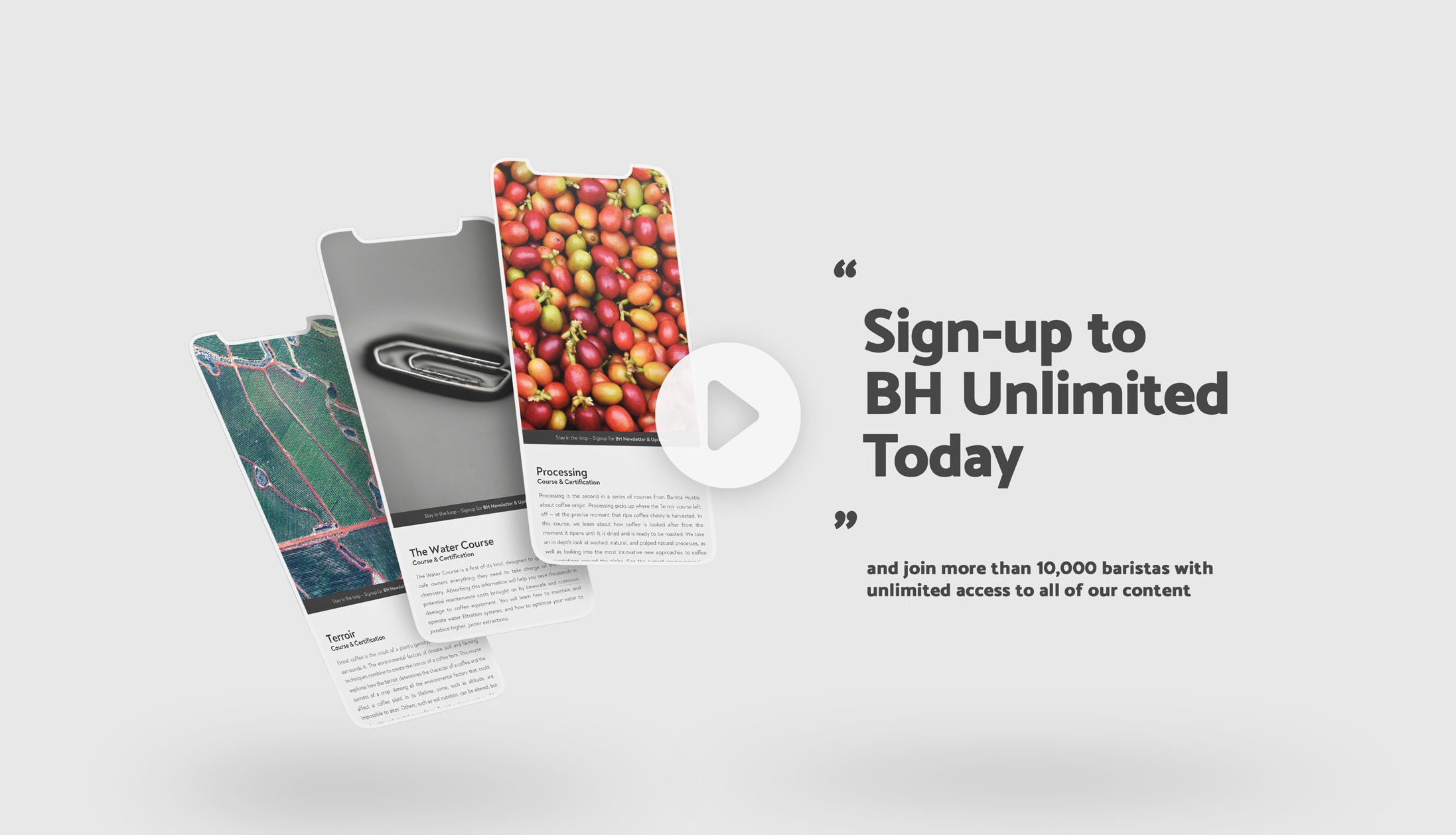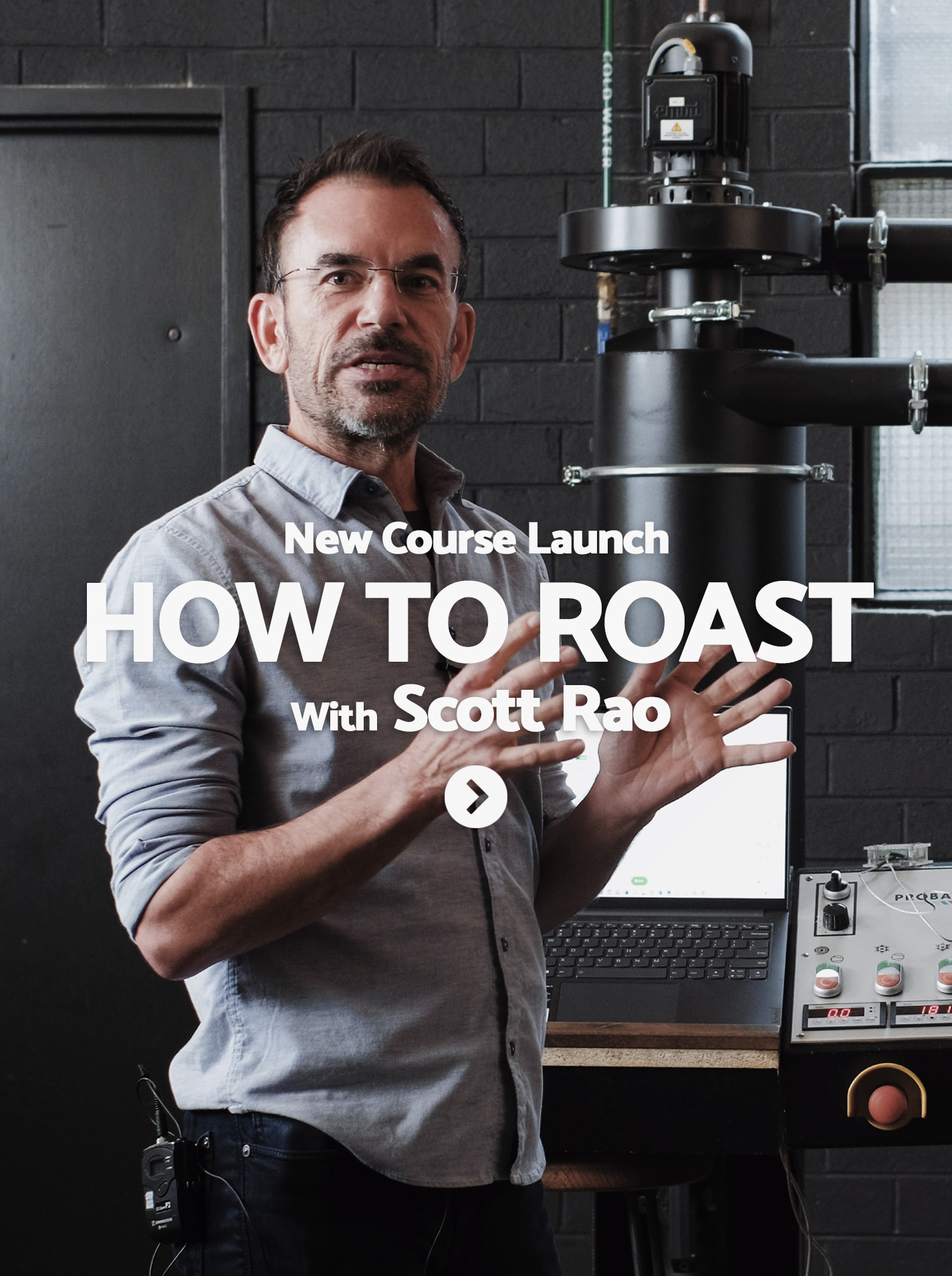
There’s a lot of hubbub about Bulletproof coffee at the moment. The company Bulletproof Executive has come under fire for a number of lofty health claims, while at the same time they attracted a $9M investment to open coffee shops in the US.
Customers and friends are asking questions, and there’s a lot of misinformation flying around. As a reader or subscriber of Barista Hustle, you’re probably either a Barista or someone’s “coffee-friend”. We’ve read, researched, experimented and even performed bloodwork on Matt so we can arm you with measured and responsible short and long answers to the most popular questions about Bulletproof coffee.
Keep in mind, we’re not doctors, and this does not constitute medical advice. We did put a lot of work into writing a measured and factual piece (MP – I literally bled for this) [AB – I had to listen to him talk keto for two weeks] but the information herein should not form the basis of any life, business or liquid-breakfast decisions.
Why?! Just Why.
Bulletproof coffee is said to provide you with long-lasting energy and focus, a fat-burning metabolism and general goodness. Lofty claims indeed! We’ll delve into each of these below.
What’s in it.
Short Answer: ~30g MCT oil, ~30g grass fed butter and 300ml coffee, blended together to achieve a fatty coffee emulsion.
Long Answer: Grass fed butter is unanimously considered delicious and pretty good for you. When you think about it, butter is just the next step after milk. Not too much controversy there, apart from the unorthodox application of emulsifying it in coffee.
The coffee for bulletproof is preferably metal-filtered (rather than paper). This leaves more coffee sediment in the brew that provides stabilisation, creating a Pickering Emulsion. Essentially, it allows you to add lots more fat without the drink separating. Smart.
Now for MCT. This is where things get interesting.
Coconut oil and its derivatives are becoming more commonly used as part of a balanced diet. Bulletproof specifically recommends MCT oil, a refined extract of coconut oil. MCT’s or medium chain triglycerides are somewhat of a nutritional enigma. To avoid turning this into a medical journal, let’s keep this fairly brief:
1. The fats in MCT skip the slow process of stomach digestion and are readily utilised for energy. They do not require the body to expend any effort for digestion, storage or use. Instant energy boost! (Don’t go out and drink some though. You’ll probably feel sick. We warned you.)
2. Some studies link them with promoting weight/fat loss and inhibiting hunger.
3. They are known to induce a state of ketosis. (More on this in a moment.)
So, “Bulletproof Coffee” is a caffeine-based beverage that includes a significant amount of MCT’s – a potent, quick and efficient energy source. Claims about crash-free energy are pretty plausible.
Can a Bulletproof coffee be anything close to delicious? I don’t want it if it’s not delicious.
Short Answer: Yeah, sort of. But it ruins a good coffee.
Long Answer: A Bulletproof coffee is a really fatty latte (read: 10x as much fat as a 230ml/8oz whole milk latte). Fat is usually delicious and when it’s emulsified in coffee, it behaves a lot like milk; so it’s not an altogether alien product. If you’re generally ok with fatty foods, and don’t mind slightly greasy lips, you’ll be fine. Don’t think you’ll be fooling anyone that it’s milk you’ve added though.
When you add regular milk to filter/drip coffee, it slightly softens the coffee flavour. In the case of bulletproof coffee, the massive amount of fat creates a drink that’s 10x more concentrated than drip coffee (think rich, heavy quadruple ristretto) but doesn’t really change the concentration of the coffee flavour. Instead, you perceive the coffee as weirdly acidic, with low sweetness and almost no bitterness. All that fat is limiting the amount of coffee flavour that can reach your taste buds, so the result is pretty far from familiar coffee town. If you’re going to make one, we strongly recommend using darker rather than lighter roasts – the acidity is truly weird.
We’d rather eat a spoonful of butter, shoot some mct oil and chase it with a really nice coffee.
Warning: Bulletproof coffee may not be appropriate for those with cholesterol or heart conditions.
Will I lose weight by drinking it? That sounds easy! Give me a Bulletproof coffee, please!
Short Answer: No.
Long Answer: Bulletproof coffee is like a really fatty latte. And when I say fatty, I’m talking somewhere close to your entire recommended daily intake of fat (~60g per serving). This isn’t necessarily a bad thing. Many popular studies have recently salvaged fat’s reputation as diet devil, showing that fats can be part of balanced diets. But, 440 calories is 440 calories. If you eat it, your body will burn it or store it somehow.
Most humans that would potentially drink a bulletproof coffee spend a lot of the day in an anabolic state. That is, they’re well fed, and blood glucose is relatively high from eating. This means their body is content to store any excess calories as glycogen in the muscles and liver, or fat in adipose tissue. If you consume fat in an anabolic state, it’s more than likely to be stored as fat, because that’s easiest for the body. But Bulletproof coffee has a trick up its sleeve.
What’s Ketosis? Will it turn me into a fat-burning machine!?
Short Answer: If you’re fasted when you drink it, and don’t eat anything else for a while afterwards – maybe.
Long Answer: Ketosis is a metabolic state where our body turns to fat as its primary energy source, saving precious sugars for the brain and a few other functions. It will happen if you fast for extended periods, or eliminate nearly all carbohydrates from your diet.
It has been observed that consuming MCT oil can induce a light ketogenic state.
Warning: inducing ketosis is not appropriate for insulin dependent diabetics.
This is interesting, because achieving a steady state of ketosis can take weeks, and is difficult to maintain. (MP – I recently finished 3 weeks of ketosis as an experiment. I can confirm it sucks.)[AB – The sugar high he went on snarfing down pastries once it was over seemed pretty epic fun though…] If consuming MCT oil can quickly induce a state of nutritional ketosis, it could be a pretty neat hack to get your body to consume its own fat stores for energy.
Don’t get too excited though. As we said before, most bulletproof-prone humans have constant and generous eating patterns. Ketosis doesn’t happen if your liver has enough glycogen (sugar) to manipulate your blood glucose levels (no matter how much MCT-loaded Bulletproof liquids you guzzle). Epileptic patients are sometimes rushed into ketosis to avoid seizures by drinking almost nothing but MCT. So it definitely works, but 30g of the stuff will only take you so far.
Being the geek Matt is, he wanted some data on this. So he bought a blood ketone meter and designed a quick n=1 experiment.
He ate a dinner with a standard macro breakdown at 7pm (40% Carbohydrate, 30% protein, 30% fat), fasted overnight and fed himself a bulletproof coffee at 9:30am. He then stabbed himself and measured blood ketone levels every 30 minutes following consumption. To make sure it was the drink and not the fasting that raised ketones, he did it all again the next day, without a bulletproof coffee (labelled ‘Control).
Did 30g of MCT oil move the needle? Was it any different to an identical period of fasting?
At the moment he drank the Bulletproof coffee (9:30am), Matt’s blood ketones were at 0.0mmol. This means his liver is happily adding glucose to his blood to keep him going. ~99% of the population is most likely somewhere between 0.0 and 0.1mmol/L of blood ketones for the vast majority of their lives (Inuits, some athletes, ketogenic dieters, those who are starving etc. will be somewhere between 0.2 and 8mmol/L).
So yes. The Bulletproof coffee raised blood ketones, especially compared to regular fasting where his energy needs were managed by his liver’s glycogen. But…
The presence of Ketones doesn’t mean that his body is using fat instead of glucose. HIs liver was still replete with glycogen from the previous day’s eating, and it takes time for the body to adapt its cells (muscles, organs etc.) to using fat as their primary energy source. The human body loves using glucose and will always choose glucose if it has the option. It’s very possible that all of the ketones detected in this test were exclusively from MCT oil, especially when you consider how they dropped off so quickly. If, however, the MCT oil actually tricked Matt into ketosis for those few hours, he could have been burning through my body’s fat stores as well. It’s a chicken or the egg scenario, but we’re calling it plausible.
Reminder: this is an n=1. We know it’s not a medical study. It was only performed on one human and it does not represent the whole population. Results may vary for others, but it sure is interesting!
Alright. Give it to me straight. Can I leverage these quasi-plausible factors to get shredded?!
Short Answer: Probably not. Just eat less.
Long Answer: If you have an early dinner (preferably low carb), fast for 12 hours (including sleep), exercise vigorously early in the morning to deplete liver glycogen, drink a Bulletproof coffee, and then eat nothing else for a number of hours afterwards, you might enter temporary nutritional ketosis. Once in ketosis, your body will have to first burn through the calories from the MCT and Butter, and then it might start burning your own fat stores instead of using glycogen.
So yeah, it could work, but you’re also drinking 200 calories of butter fat that’s probably going to be stored as fat. Eating less will pretty much do the same thing, and is markedly more simple.
Now’s probably a good time to reference the Bulletproof Diet which, for the most part, steers the user away from carbohydrates. But if you follow common ketogenic diet advice, there’s far too many carbs in there (~10-20%) to maintain deep ketosis (~0-10%), and you’d likely remain anabolic.
What are mycotoxins? They sound deadly! Does your coffee have mycotoxins in it? I’m allergic to mycotoxins.
Short answer: Don’t worry about it, roasting kills whatever minuscule amounts may exist in coffee.
Long answer: Mycotoxins are mold byproducts of fermentation processes, including all green coffee processing to some degree, which the Bulletproof company claims make it into your roasted coffee beverage and interfere with energy and brain function. However, research shows that mycotoxins do not survive the 450 degree coffee roasting process at any meaningful concentration. Also, mycotoxins are found in all sorts of food in trace amounts (including breastmilk…), with no observable health issues.
In coffee terms, Bulletproof are claiming that both traditional natural (dry) processing and washed (wet) processing of coffee cherries involves a fermentation stage where mold can form on the green coffee beans; so Bulletproof only buys coffees that have gone through a newer style of processing usually referred to as Eco-pulping, which uses reduced water and a mechanical demucilager and washer, most commonly a Penagos machine, to separate bean from cherry.
There is a kernel of truth here that makes the resulting exaggeration attractive: traditional coffee processing does involve some degree of fermentation, which can cause mold, and eco-pulped coffees in fact do not meaningfully ferment during the cherry processing stage. However the wet beans from eco-pulping must still be dried as in other processing methods, and this opens up even eco-pulped beans to the potential of mold forming. More to the point though, any sort of mold formation is wildly detrimental to coffee flavour, so every step of coffee production has been carefully considered to minimize mold, and it is all but guaranteed that any specialty grade coffee you are drinking is completely free of any mold defects.
However, even for green coffee samples contaminated with mold, the health risks of drinking the actual roasted coffee have been found to be all but nonexistent. Way back in 1980, a meta-analysis study of mold and coffee found that: “Because of the extremely low frequency of findings, the low levels of toxins, and the experimental data showing 70-80% destruction by the roasting process of toxin added to green coffee, further study on this topic has been discontinued.”
These results were backed up by a 2001 investigation into the effects of roasting on toxins, and a 2002 study on toxins in green coffee. A more recent 2012 study found that drinking coffee did not significantly increase blood mycotoxin levels above normal environmental conditions.
If you’re still not convinced, debunking Bulletproof Coffee has been a rich vein of internet writing for quite some time, with everyone from food and coffee geeks to Paleo-heads and Gizmodo getting in on the game. The most definitive long read is probably this one from Authority Nutrition.
Okay! So maybe MCT + butter in coffee induces light ketosis, and maybe it gives some people energy. So what’s the issue?
There isn’t one! Except for all the bogus claims about mycotoxins, and the rather indeterminate nature of whatever ketosis is happening. Well, and that thing about nicely roasted, acidic coffees not tasting great with tons of butter in. But you know what? People can do what they want, and hopefully now you’re a little better prepared to understand why.
If you have found this useful and want to enjoy delicious coffee with the rest of the community – register for our monthly Superlatives coffee subscription. Or if you just want to keep up with every thing Barista Hustle – sign up to the Newsletter.




0 Comments